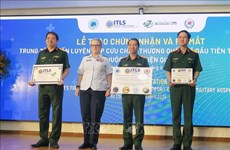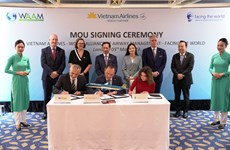UN experts hail VN’s efforts in H5N1 flu control
The Vietnamese government has made quite
strong efforts to control H5N1 and it has been relatively successful.
The Vietnamese government has made quite
strong efforts to control H5N1 and it has been relatively successful.
Dr. Julie Hall, senior technical expert of the United Nations System of Influenza Coordination (UNSIC), made the remark during an interview with a Vietnam News Agency reporter on the sidelines of the seventh International Ministerial Conference on Animal and Pandemic Influenza (IMCAPI Hanoi 2010), which opened in Hanoi on April 20.
Vietnam has kept the complex development of the disease under control through vaccination programmes, the strengthening of systems to detect disease in animals, and a health system that ensures cases of human infection are treated as quickly as possible.
Vietnam has a large population of poultry, which makes it very difficult to control the disease, the expert said, explaining that this is why bird flu outbreaks still occur in some localities in Vietnam .
However, she said, the Vietnamese government has made tremendous efforts. It can be seen that the number of human cases in Vietnam has significantly lessened, the number of animal outbreaks have decreased and the spread of the virus across the country is now much smaller than it was before, she added.
Controlling animal and pandemic influenza is not a short-term, but a long-term issue, she said, adding that the Vietnamese government’s willingness to host the conference is a testament to its commitment to that long-term effort to control the disease.
UN Technical agencies, including the World Health Organisation (WHO), the Food and Agriculture Organisation (FAO) and UNSIC are all here in Vietnam to give support to the country in raising people’s awareness on the disease, disease transmission and to facilitate the sharing of information.
More than 300 delegates involved in the agriculture, livestock and health sectors from countries and territories around the world at the two-day conference will assess global progress in controlling the highly pathogenic avian (A/H5N1) and pandemic flues and propose new steps to reduce and potentially eradicate this serious threat over the coming years.
After discussions, ministers will issue a joint statement that will be the foundation for cooperation between countries and international organisations in the years to come.
A/H5N1 was reported for the first time in Asia in 2003 and has spread to other countries, said Jean Marc Olive, WHO Chief Representative in Vietnam, adding that the disease has, to date, infected 491 people, resulting in 290 deaths, including 59 in Vietnam./.
Dr. Julie Hall, senior technical expert of the United Nations System of Influenza Coordination (UNSIC), made the remark during an interview with a Vietnam News Agency reporter on the sidelines of the seventh International Ministerial Conference on Animal and Pandemic Influenza (IMCAPI Hanoi 2010), which opened in Hanoi on April 20.
Vietnam has kept the complex development of the disease under control through vaccination programmes, the strengthening of systems to detect disease in animals, and a health system that ensures cases of human infection are treated as quickly as possible.
Vietnam has a large population of poultry, which makes it very difficult to control the disease, the expert said, explaining that this is why bird flu outbreaks still occur in some localities in Vietnam .
However, she said, the Vietnamese government has made tremendous efforts. It can be seen that the number of human cases in Vietnam has significantly lessened, the number of animal outbreaks have decreased and the spread of the virus across the country is now much smaller than it was before, she added.
Controlling animal and pandemic influenza is not a short-term, but a long-term issue, she said, adding that the Vietnamese government’s willingness to host the conference is a testament to its commitment to that long-term effort to control the disease.
UN Technical agencies, including the World Health Organisation (WHO), the Food and Agriculture Organisation (FAO) and UNSIC are all here in Vietnam to give support to the country in raising people’s awareness on the disease, disease transmission and to facilitate the sharing of information.
More than 300 delegates involved in the agriculture, livestock and health sectors from countries and territories around the world at the two-day conference will assess global progress in controlling the highly pathogenic avian (A/H5N1) and pandemic flues and propose new steps to reduce and potentially eradicate this serious threat over the coming years.
After discussions, ministers will issue a joint statement that will be the foundation for cooperation between countries and international organisations in the years to come.
A/H5N1 was reported for the first time in Asia in 2003 and has spread to other countries, said Jean Marc Olive, WHO Chief Representative in Vietnam, adding that the disease has, to date, infected 491 people, resulting in 290 deaths, including 59 in Vietnam./.











